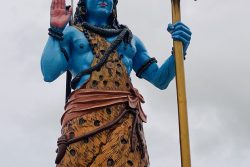In fact I cry too easily:
sympathizing with someone close to me who hurts,
feeling the shallow pain of characters
in some silly TV show, or choking up
for the umpteenth time re-reading
Cressida’s betrayal of Chaucer’s Troilus
Where I think I’m also feeling the poet’s pain:
“And now my penne, allas! With which I write
Quaketh for drede of what I moste endite” –
And the backs of my hands and the hems
of my sleeves are wiping tears…
And that is how I will greet the New Year,
despite the noisy beach, despite
the numb of alcohol and the fireworks
bright as tears in my eyes:
I will see only the absence,
feel only the coldness of my own flesh
and the emptiness of my heart, unfilled
by any love…
Yet I will lift my glass – as always –
to smiling lips and look hopefully
into passing eyes, and wipe the tears
and wish the world (and myself)
the best of luck for this new year…
Mark McWatt, Three Poems at Year-End
 There are famous poems of and for the season, some quite in tune, appropriate in tone and theme, like Derek Walcott’s Season of Phantasmal Peace. Others are doubtful, enquiring and designed to raise questions rather than celebrate something settled, as in the case of T S Eliot’s Journey of the Magi.
There are famous poems of and for the season, some quite in tune, appropriate in tone and theme, like Derek Walcott’s Season of Phantasmal Peace. Others are doubtful, enquiring and designed to raise questions rather than celebrate something settled, as in the case of T S Eliot’s Journey of the Magi.
In the December 2009 issue of Poui, the Cave Hill Literary Journal, Mark McWatt writes Three Poems at Year-End, which play on the seasonal celebrations and metaphors of the end of year. But they are more the probing, question-raising type, more out of harmony than in season. They play on the metaphors only to introduce or set up a platform for retrospective self-examination, of time, love, pain, tears and new beg
innings. He presents a poet going through a crisis, a stage of life for which the ‘triptiych’ is a rite (of passage) re-examining a life in search of fulfilment and the assurance of love, reflecting on the passage of time and looking with hope but little gladness to the new year.
The poet could be McWatt himself, or he could have a more widely embracing identity, but at year-end he seems to assess his achievements and find little in terms of satisfaction appearing overcome by a sense of hopelessness. It is a happy season, but the poet does not appear to be at one with joyful feelings and celebrations; he is more inclined to long for love and cry tears for the new year.
The first of this trilogy is Choosing My Pain in which the poet’s images are clearly drooping and non-celebratory.
As the year burns slowly to its end
like a candle wick
about to collapse in its pool of wax,
I rouse myself from the sad oblivion
of holiday indulgence and try to face the random raids
life launches of late upon my battered heart.

From a time when he thought he was happy, it suddenly dawns upon him “like a terrible new year of uncertainty” that all he has is pain. He sits loveless and hopeless “at the end of a lifelong year” with only pain, wondering “what happened to love.”
In the second, Waiting for Love, he describes it as “a joyful thing, in the beginning” but it all seems to have gone astray. The poet moves from an extroverted reaching out to a time when “the waiting room grew cold” and he retreated into his poetry. Then, after real life experience,
…At the end of a bleak year,
one wife and two adult children later,
I find I’m still waiting,
waiting with stupid hope for the only love
that has ever fuelled my hopeless heart.
The third piece is Tears For The New Year, in which he seems still in a “hollow world” filled with “a flood of pain.” He cries for everyone else’s hurt even when it is shallow or not real, happening only to imaginary characters. He declares himself a compulsive weeper over everything and nothing, producing a tone of mock seriousness in the poem. Yet the note of seriousness creeps back in as he says he will greet the new year with tears, giving an impression of a deeper, more profound sorrow which lies beneath the revelry on the beach, the brightness and “the numb of alcohol.” Note the excellent efficiency of McWatt’s imagery in the way the flashes of light from the festive fireworks become “bright as tears in my eyes.”
The poem ends on that note with the poet pretending to be a part of the seasonal celebrations while hiding his hopelessness, emptiness, “unfilled/by any love.” He does not look forward with any expectations for the new year. The tears with which he greets the new year reflect the bright light from the fireworks in which everyone else around him is revelling.
McWatt’s introduction to the poem of Chaucer’s Troilus and Cressida is very interesting and instructive. He says he sheds tears for the way Cressida betrays Troilus. Chaucer’s long poem is based on the story taken from the character Troilus in the Trojan War, narrated by the great Greek epic poet Homer in The Iliad. The story is remade in the Middle Ages and Chaucer writes it as a kind of Courtly Love romance. Troilus and Cressida are lovers, but Cressida is fickle like the women who cause pain and suffering to their poet lovers in that courtly romance tradition. Shakespeare also wrote his version of this in the unconventional tragedy Troilus and Cressida. Chaucer begins his poem in the guise of the epic poet calling on the Muse and conjuring up sympathy for Troilus. He also asks for assistance as he is about to perform one of the great acts in English literature, that is, writing in his own local language rather than Latin, the official language of learning in London in the 14th and 15th centuries. This gave rise to literature in the language that grew into modern English.
McWatt puts himself in the place of such a poet, sharing the pain. But his personal biographical experience is of importance here. Since his first book of poems Interiors (1991), he has risen confidently in stature to be one of Guyana’s most accomplished, decorated and celebrated writers. His second book, The Language of Eldorado, won the 1994 Guyana Prize and his first book of fiction, Suspended Sentences, swept the international literary prizes in 2006. It is clear from the internal evidence and from his comments in his latest collection of poetry, The Road to Le Repentir, that he draws on autobiography for most of this writing. His reference to wife and adult children in these three poems is clearly personal, and he is also without doubt reflecting on a stage and reflections in his own life.
But his evocation of Chaucer and “feeling the poet’s pain” takes it further. He is therefore moving out of personal experience into something resembling the experience of all poets, which may be translated into the experience of tragic, frail humanity.








